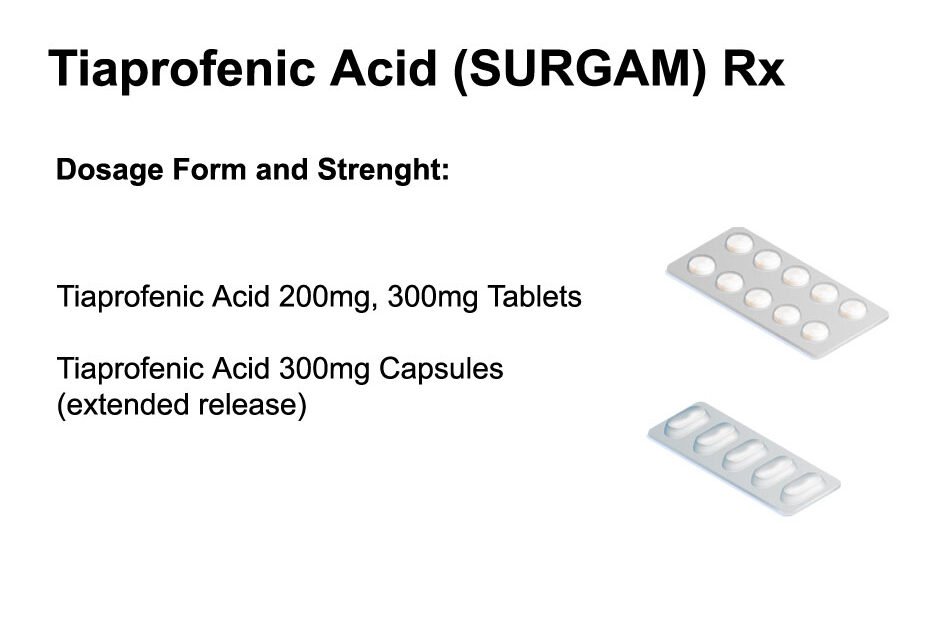Classes
Tiaprofenic Acid (SURGAM) is NSAID ( non steroidal antinflammatory drug)
DAE Class; Rx
Common Brand Names; SURGAM, Surgam SR, Albert Tiafen, Albert Tiafen SR
- Non steroidal anti-inflammatory drugs (NSAIDs)
Description
Tiaprofenic Acid is NSAID ( non steroidal antinflammatory drug), similar to ibuprofen. It reduces inflammation and fever and relieves pain. It is also used in the treatment of arthritis, headaches and menstrual cramps.
Tiaprofenic Acid Uses
Tiaprofenic Acid is primarily used in conditions like Ankylosing spondylitis, Musculoskeletal disorders, Nausea and vomiting (palliative care), Osteoarthritis, Pain, Rheumatoid arthritis.
It is used to reduce pain, swelling, and joint stiffness from arthritis. Reducing symptoms of arthritis may improve your ability to move/exercise, work, and perform tasks normally.
Tiaprofenic acid is known as a nonsteroidal anti-inflammatory drug (NSAID). It works by blocking your body’s production of certain natural substances that cause inflammation.
Ask your doctor about non-drug treatments and/or using other medications to treat your chronic pain.
Contraindications
Tiaprofenic Acid is contraindicated in conditions like Peptic ulcer, Renal diseases.
Before taking tiaprofenic acid, tell your doctor or pharmacist if you are allergic to it; or to aspirin or other NSAIDs (such as ibuprofen, naproxen, celecoxib); or if you have any other allergies. This product may contain inactive ingredients, which can cause allergic reactions or other problems. Talk to your pharmacist for more details.
Before using this medication, tell your doctor or pharmacist your medical history, especially of:
- asthma
- aspirin-sensitive asthma (a history of worsening breathing with runny/stuffy nose after taking aspirin or other NSAIDs)
- bleeding/clotting problems
- blood disorders (such as anemia)
- growths in the nose (nasal polyps)
- heart disease (such as previous heart attack)
- high blood pressure
- liver disease
- stroke
- swelling (edema, fluid retention)
- stomach/intestinal/esophagus problems (such as bleeding, heartburn, ulcers)
Kidney problems can sometimes occur with the use of NSAID medications, including tiaprofenic acid. Problems are more likely to occur if you are dehydrated, have heart failure or kidney disease, are an older adult, or if you take certain medications. Drink plenty of fluids as directed by your doctor to prevent dehydration and tell your doctor right away if you have pink/bloody urine or any unusual change in the amount of urine.
Tiaprofenic Acid Side Effects
Tiaprofenic Acid produces potentially life-threatening effects which include Hemorrhage, Agranulocytosis, Renal failure, Hepatic failure. which are responsible for the discontinuation of its therapy.
The signs and symptoms that are produced after the acute overdosage of Tiaprofenic Acid include Epigastric pain, Nausea.
The symptomatic adverse reactions produced by Tiaprofenic Acid are more or less tolerable and if they become severe, they can be treated symptomatically, these include Drowsiness, Skin rashes, Gastritis, SweatingX, Nausea and vomiting, Heart burn, Paresthesias.
Warnings
Avoid use in patients with prior history of urinary symptoms and discontinue at first sign of genitourinary problems. Severe cases of cystitis (bladder pain, dysuria, urinary frequency, hematuria) due to tiaprofenic acid have been reported. Safety and efficacy have not been established in pediatric patients. Elderly are at a high risk for adverse effects from NSAIDs. As many as 60% of elderly can develop peptic ulceration and/or hemorrhage asymptomatically.
Drug should not be given to Paediatrics, Pregnant Mothers, Geriatrics, and Neonates
Pregnancy and Lactation
Drug should not be given to Paediatrics, Pregnant Mothers, Geriatrics, and Neonates
Maximum Dosage
Tiaprofenic Acid Dose
Oral
Ankylosing spondylitis, Capsulitis, Epicondylitis, Fibrositis, Low back pain, Osteoarthritis, Postoperative inflammation, Postoperative pain, Rheumatoid arthritis, Sprains, Strains
Elderly dose: Use the lowest effective dose for the shortest possible duration of treatment.
How supplied
Tiaprofenic Acid Dosage form and strenght.
Tablets:
- 200mg
- 300mg
Extended Release capsules:
- 300mg extended release capsules
